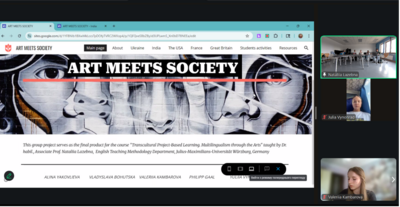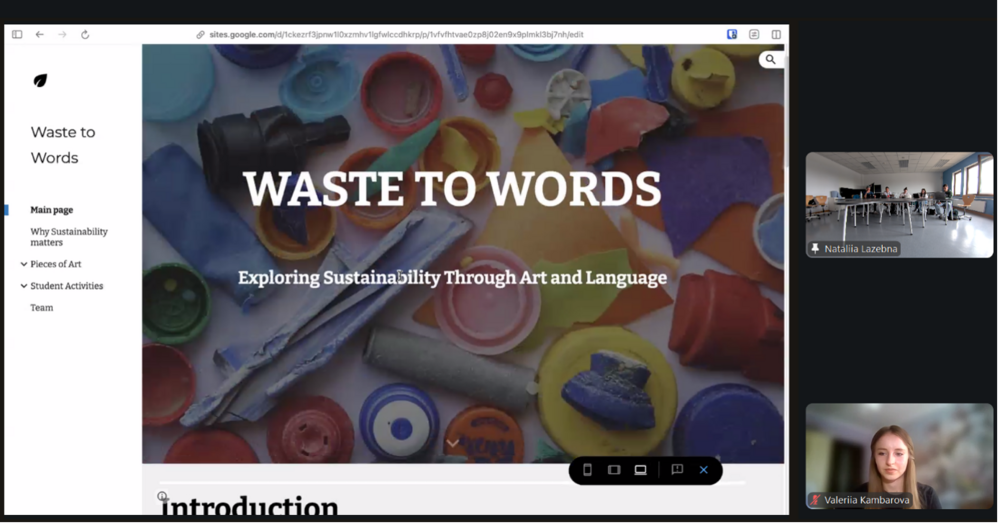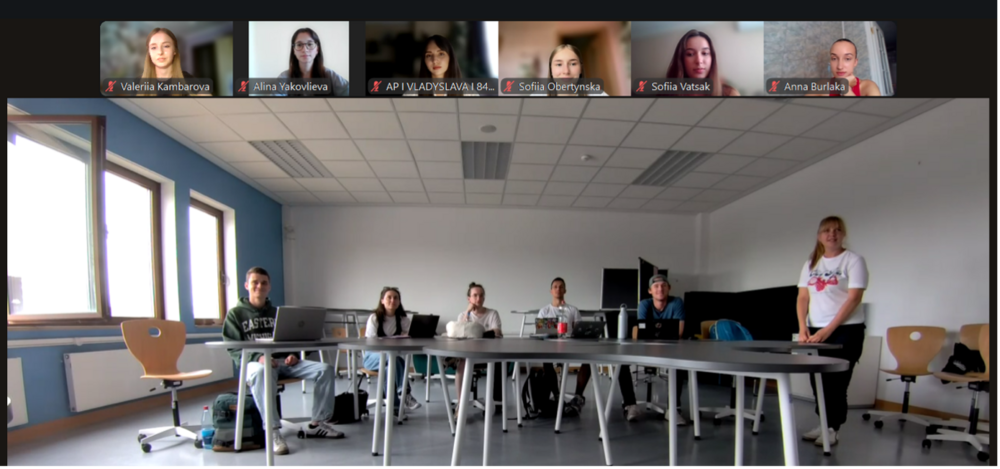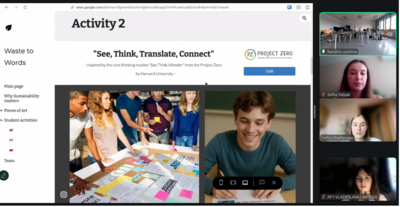Article: Transcultural Project-Based Learning
Transcultural Threads: Weaving Art and Language into Teacher Education Across Borders

At English Teaching Methodology Chair, Julius-Maximilians-Universität Würzburg, under the guidance of Dr. habil. Nataliia Lazebna, the course “Transcultural Project-Based Learning: Multilingualism through the Arts” consistently showcases an innovative and impactful pedagogical approach. Designed for future foreign language teachers, the course blends artistic expression with intercultural collaboration, fostering global competence and creative engagement in a hybrid learning environment. A cornerstone of this success is its collaborative learning across borders, bringing together students from Germany and Ukraine. The students partner Universities of TEFL Chair from Vasyl' Stus Donetsk National University and Zaporizhzhia National Polytechnic University participated in the course during the summer semester 2025 and co-created multilingual digital projects together with the students from TEFL Department, Julius-Maximilians-Universität Würzburg. This international collaboration facilitates shared responsibility and creative synergy.
Through four extensively evaluated projects "Waste to Words," "Art Meets Society," "The Language of Feelings," and "Everyday Feminism“ the course successfully fosters intercultural competence, multilingualism, and critical engagement with pressing societal issues through artistic expression.
A Holistic Approach to Learning and Teaching
The core of this course lies in its unique pedagogical framework, which leverages various art forms, such as visual arts, music, drama, performance, and digital media, as a primary source for language acquisition and a deeper understanding of complex concepts. This approach enriches "both content and delivery with creative depth" and encourages learners "to interpret art not only as aesthetic expression but also as a reflection of societal experience and transformation" (further citations are taken from students’ final projects).
Several overarching themes consistently emerge across all evaluated projects:
• Integration of Art and Language for Deeper Learning: Art forms are central to language acquisition and understanding, enriching content and delivery with creative depth.
• Fostering Transcultural Understanding and Intercultural Dialogue: A key objective is to cultivate transcultural perspectives, often achieved through international collaboration and comparative analysis of diverse cultural contexts. Projects specifically aim to "bridge Eastern and Western emotional frameworks" and highlight "how gender norms are shaped and challenged across different societies".
• Development of Multilingual Competencies and Linguistic Diversity Awareness: Multilingualism is a fundamental component, incorporating languages such as English, German, Ukrainian, French, Romanian, Chinese, and Korean. This not only supports language learning but also "promot[es] linguistic diversity and awareness" and encourages exploration of "how emotions are encoded and expressed differently across linguistic systems". The "Waste to Words" project importantly notes that multilingualism is "far more than code-switching; it is a powerful lens through which we can understand diverse worldviews and foster global awareness".


Addressing Pressing Social and Global Issues
The projects actively tackle significant contemporary challenges:
- "Art Meets Society" explores "the role of art as a form of social and cultural expression during times of crisis," focusing on "social turmoil in countries such as India, the UK, the US, France, and Ukraine". It positions "art as both a mirror of society and a catalyst for dialogue and change".
- "The Language of Feelings" investigates "how emotions are expressed, interpreted, and shaped across cultures," revealing "subtle cultural nuances that influence how we experience and communicate feelings".
- "Everyday Feminism" aims "to challenge gender stereotypes through multilingual communication, personal reflection, and creative expression," empowering future educators to integrate "gender-sensitive, culturally responsive content into their language classrooms".
- "Waste to Words" fosters "ecological awareness and intercultural competence" by examining "how different societies conceptualize and communicate about waste, using multilingual and artistic approaches". This project highlights that "ecological issues are not only scientific in nature but are also shaped by cultural narratives and linguistic frameworks".
• Emphasis on Reflective Experiences and Personal Development: Reflective practices are integral, encouraging "thoughtful reflection on the project process, learning outcomes, and personal or group development". Students engage in "reflective journaling (written and voice recorded)" and share "real-life experiences through both narrative and artistic forms", fostering "emotional resilience, critical reflection, and empathy".
• Strong Pedagogical Value and Classroom Applicability: All projects are designed with clear pedagogical implications, demonstrating "strong educational value, relevance to teaching practices, and potential for classroom application". They offer "replicable model[s]" for integrating art, social issues, emotion, and sustainability into language education.
Empowering Future Educators and Responding to Global Crises
The projects consistently provide a holistic learning environment that extends beyond traditional language instruction, combining "linguistic development" with "critical thinking and intercultural awareness". A consistent goal is to "empower pre-service foreign language teachers" to integrate "creative, socially responsive content into language teaching, fostering empathy, historical awareness, and global citizenship in the classroom". This includes incorporating "gender-sensitive, culturally responsive content" and addressing "global challenges through creative, reflective, and pedagogically meaningful practices".
Crucially, these projects are explicitly framed as "vital spaces for expression, healing, and intercultural dialogue, especially for students affected by conflict, displacement, or societal disruption". This highlights the significant therapeutic and socially relevant dimension of the course.
The implementation of these projects has been remarkably successful, evidenced by "Excellent" overall scores across all four evaluations. The "Collaboration & Teamwork" criterion consistently scored perfectly or near-perfectly, demonstrating "effective international collaboration," "shared responsibility," and "creative synergy".

Innovative Language Activities and Multimodal Engagement
The projects incorporate diverse and engaging language tasks, which are consistently described as "learner-centered, and culturally responsive". Examples include:
• "Art Detective," "art interpretation, vocabulary work, and drama" in "Art Meets Society".
• "Focus on linguistic and cultural factors, idioms, poems, and songs related to feelings, role-play, and reflective journaling" in "The Language of Feelings".
• "Reflection cards, multilingual word walls on gender and emotion, storytelling across languages, performance tasks, TikTok video creation, and the analysis of songs and films" in "Everyday Feminism".
• "What Does ‘Waste’ Mean Around the World?" and "See, Think, Translate, Connect" in "Waste to Words".
The effective and creative use of multimedia tools (video, audio, digital tools and platforms, podcasts, digital storytelling) is consistently praised, with all projects scoring perfectly for this criterion. These tools "enhance engagement and provide diverse modes of expression across languages and media formats", creating a "rich, multimodal learning environment".
In summary, the projects evaluated demonstrate a highly successful application of transcultural project-based learning. They effectively integrate multilingualism and various art forms to engage pre-service foreign language teachers in critical reflection on significant social issues, while simultaneously developing their pedagogical skills and fostering deep intercultural understanding.
Looking ahead, we are committed to further disseminating these projects at international conferences and events. To facilitate broader adoption, we aim to compile hands-on guidelines for the further dissemination of the course. Furthermore, we are actively seeking funding and support to expand the course and its projects' impact on the global future teachers’ community.


